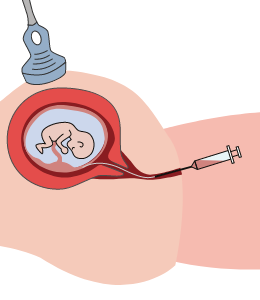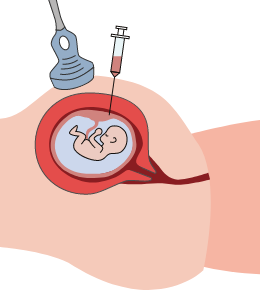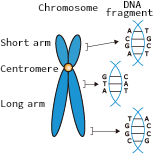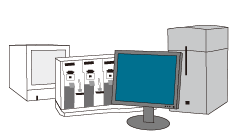
This test involves collecting a sample of chorionic villi, a part of the placenta, between the 10th and 15th week of pregnancy (recommended after the 11th week), to check for chromosomal abnormalities in the baby. It is a definitive test that can detect all chromosomal abnormalities, including Trisomy 21 (Down syndrome), Trisomy 18, and Trisomy 13. The advantage of this test over amniocentesis is that it provides results earlier.
At our clinic, we offer chromosome testing (G-banding) and can also conduct a microdeletion test (such as microarray testing) to detect small chromosomal deletions that could cause abnormalities in the fetus. As the age of the couple increases, the likelihood of chromosomal abnormalities in the fetus also rises, which is why many couples choose to undergo chorionic villus sampling (CVS).
While NIPT (Non-Invasive Prenatal Testing) is also conducted around the same time, it is a screening test to check if there are indications of chromosomal abnormalities, not a definitive test. Even if NIPT results are negative, there is still a possibility of false negatives, meaning it is not guaranteed that the results are truly negative. Therefore, if you are unsure whether to choose NIPT or CVS, we recommend the definitive CVS. However, there is a very small risk (about 0.2%) of miscarriage associated with this procedure.
For couples who have already undergone PGT (Preimplantation Genetic Testing), we strongly recommend amniocentesis over CVS, as the sample for PGT comes from the placenta.
If you're concerned about issues other than chromosomal abnormalities, a detailed fetal ultrasound is an effective test and can provide added reassurance when performed in conjunction with the other tests.
Between the 10th and 15th week of pregnancy, an ultrasound (either transvaginal or transabdominal) is performed to confirm the location of the placenta and umbilical cord attachment. Chorionic cells are then collected for testing. The collected chorionic cells are analyzed through chromosome testing (G-banding) and, if needed, a microdeletion test (such as microarray testing). Results can typically be provided within approximately two weeks after the test.
After the procedure, you will rest quietly in the clinic for 2–3 hours to monitor the baby's condition before you can go home.
On the day of the test, please avoid bathing and try to rest quietly.
▶︎ Transvaginal Method
For the transvaginal method, a chorionic villus sampling (CVS) forceps is inserted through the vagina into the cervix to collect chorionic cells. After the procedure, there may be slight bleeding, which typically resolves within 1-2 days. If the bleeding persists longer or if the bleeding is heavy, please contact us.

▶︎ Transabdominal Method
A needle is inserted into the abdomen to collect chorionic cells. Local anesthesia is used during the procedure, so there is usually little to no pain. However, if the pain at the needle insertion site persists or becomes more severe, please contact us.
※ If the placenta is positioned towards the back of the mother’s body, making the transabdominal method difficult, the transvaginal method will be used instead.

▶︎ Chromosome Testing (G-Banding)
The standard chorionic villus sampling (CVS) test is performed using the G-banding analysis method. Chorionic cells are cultured to increase the cell count, and then cells in the mitotic phase (when the chromosomes are visible) are selected, stained, and observed for analysis.
This method allows for the identification of the number of chromosomes from 1 to 22, as well as the sex chromosomes (X and Y). Additionally, because chromosomes are observed individually, significant abnormalities, such as partial duplications or deletions, and translocations (where parts of chromosomes are swapped), can be detected.
▶︎ Microdeletion Testing (e.g., Microarray)
Chromosomes are composed of proteins and DNA (genes).
DNA consists of four types of bases—adenine (A), thymine (T), guanine (G), and cytosine (C)—which form a double-helix structure. The sequence of these bases (base sequence) carries genetic information.
While the number and arrangement of bases are specific to each species, there are regions where the sequence differs from the standard base sequence approximately once every few hundred to a thousand bases.
These single-base differences are called single nucleotide polymorphisms (SNPs), which contribute to individual differences and genetic diversity.
In humans, it is estimated that there are about 10 million SNPs among the 3 billion bases, and several SNPs have been identified as being associated with congenital disorders.
By using a method called "SNP microarray," which analyzes chromosomes at the base sequence level, it is possible to detect subtle chromosomal abnormalities that cannot be identified through G-banding analysis.
Chromosomal microdeletion syndromes vary in symptoms depending on the location of the deletion (Table 1). Some cases may present no symptoms at all, while others may involve severe complications.
A well-known example is DiGeorge syndrome, which is associated with organ development abnormalities, congenital heart defects, intellectual disabilities, speech disorders, and immunodeficiency. The prevalence of this syndrome is estimated to be approximately 1 in 4,000 to 5,000 individuals.

|
|

|
|

|
|
6) Amplifying DNA fragments
↓ 7) Hybridization ↓ 8) Analysis |
9) Can detect even subtle abnormalities |
Table 1. Chromosomal Microdeletion Syndromes
| Name | Chromosomal Deletion Site | Main Symptoms |
|---|---|---|
| Wolf-Hirschhorn Syndrome | Chromosome 4 short arm (4p) | Distinctive facial features, growth retardation, severe intellectual disability, hypotonia, intractable epilepsy, feeding difficulties |
| Williams Syndrome | Chromosome 7 long arm (7q11.23) | Aortic valve stenosis, intellectual disability, 'elfin' facial features, transient hypercalcemia in infancy |
| Prader-Willi Syndrome | Paternal chromosome 15 long arm (15q11) | Hypotonia from birth, obesity, gonadal dysfunction, small hands and feet, intellectual disability |
| Angelman Syndrome |
Maternal chromosome 15 long arm (15q11)
(15q11) |
Seizures, puppet-like ataxia, spontaneous laughter, hand-flapping, severe intellectual disability |
| Miller-Dieker Syndrome | Chromosome 17 short arm (17p13.3) | Lissencephaly, low upward-facing nose, severe developmental delay, seizures, severe intellectual disability |
| DiGeorge Syndrome | Chromosome 22 long arm (22q11.21) | Hypoplasia or absence of the thymus and parathyroids, congenital heart defects, cleft palate, intellectual disability, psychiatric issues |
This test can detect chromosomal abnormalities such as Trisomy 21 (Down syndrome), Trisomy 18, Trisomy 13, and other chromosomal number abnormalities, as well as structural abnormalities such as small deletions. Chromosomal number abnormalities tend to become more likely as maternal age increases, while microdeletions are said to occur randomly, regardless of maternal age.
Additionally, depending on which chromosome is affected and whether it involves number or structural abnormalities, the outcomes and symptoms for the baby may vary. Therefore, it is important for both parents to have thorough discussions before the test to understand what actions may follow based on the results.
While this test is diagnostic, it does not guarantee the detection of all congenital disorders. Other factors, such as contamination from maternal cells, poor culture of fetal or placental cells, unexpected causes, or multiple pregnancies, may prevent the test from being completed successfully or lead to inaccurate results.
In some cases, mosaicism (a mixture of normal cells and chromosomal abnormalities) may be detected, or subtle chromosomal changes with unclear significance may be found.
We offer genetic counseling at our clinic and provide support for both of you, so please feel free to consult us.
| Chorionic Villus Sampling (Including Procedure Fee) | G-Banding Method | ¥168,000(with tax ¥184,800) |
| + Rapid Method (such as FISH) | +¥20,000(with tax ¥21,000) | |
| + Microdeletion Detection (Microarray) | +¥100,000(with tax ¥110,000) |
※Fees are subject to change without prior notice.
※Results of the test may be delayed. Please understand that this is only an estimate.
※An appointment is required to undergo the test. Please contact us by phone for inquiries.
English Help Desk
TEL:070-1820-0909
Email:english_help@oakclinic-group.com
[Reception time]
Monday-Saturday 09:00-17:00
For urgent inquiries, please contact us by phone.